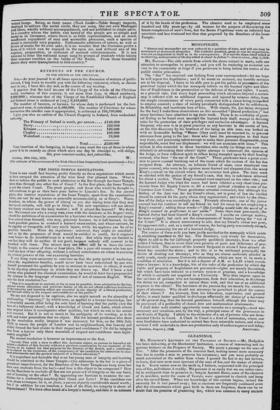THE INNER TEMPLE REGULATIONS.
THERE is one small fact bearing pretty directly on these regulations which seems to have escaped the attention of the wise head that planned them. What is there to induce the public to seek admission to the Bar through the Inner Temple, inure than through any other Inn of Court ? Ill the first place, the Inner Temple is not the crack Court. The great people, and those Who would be thought so, will continue to go as they have gone before to Lincoln's-Inn. In the second place; the interior regulations of the Inner Temple, apart from the examination whim, are not by any. mean so generally accommodating as at Gray's. Those, therefore, to whom the power of dining on any day during term that they may find most suitable, will still go to Gray's. The new regulations will not attract the dandy student nor the busy student ; will it attract the learned? We think not. We cannot see why a young man, even with the Ancients at his fingers' ends, should be ambitious of an examination by a barrister who must be somewhat longer from school than himself, who may, precisely because he is half learned, he the worst possible person to conduct a learned examination, and whose censure, be he capable or incapable, will very much injure, while his applause can be of no
possible benefit. Were the regulations universal, they might do mischief; and so far the proposers of them would be entitled to credit, for it requires some brains to do mischief even in a small way. But while they are limited to
one Inn they will do neither ill nor good, because nobody. will consent to be troubled with them. The utmost they en iffect will be to leave the inner
Temple, in the course of three or fours-years, like a poor old woman who has survived the last of her offspring, without a solitary catechumen on whom to exercise the critical powers of the one examining barrister. If any thing were necessary to convince us that the petty spirit of exclusion, which the regulations breathe, could never have been entertained by one who himself possessed the qualities he was so anxious to ascertain in others, it would be the slip-slop phraseology in which they are drawn up. Had it been a real scholar who planned the classical examination, he would at least have propounded the scheme in the language of common sense if not of common English. What says the first resolution ?—
" That it is expedient to exclude, as far as may be possible, from admission to the bar, persons whose education and previous habits of life do not afford sufficient testimony Of the integrity and learning which are essential to the dignity of a liberal profession, and the best titles to the respect and confidence of the public.'
We are not disposed to be captious, else we might remark on the absurdity of confounding "learning," by which term, as applied to a lawyer knowledge, law is invariably meant, (that being the only kind of learning that the public care the turn of a halfpenny about), with a knowledge of Greek and Latin, which clients May respect when it accompanies other qualities, hut which no one in his senses ever trusted. But it is not so much to the ambiguity of its wording, as to its milk and water generalism that we object. Did the learned gentleman who drew up the resolution really imagine it was necessary for him, on the 10th July 1829, to assure the people of London and its neighbourhood, that honesty and ability formed the best claims to their respect and confidence ? Or did he imagine that from a lawyer only these essentials of respect and confidence were legitimately exigible ?
The second resolution is however an improvement on the first.
" Second, That with a view to effect this desirable object, no person be hereafter admitted a student of this Society without a previous examination by one barrister of the
Society, to be named for that purpose by the Masters of the Bench, and a certificate,
to be signed by the examiner, of the competency of the candidate for admission in classical attainments and the general subjects of a liberal education."
It is expedient arid desirable that none but young men of integrity and learning should be admitted to the Inner Temple—(the admission to the bar is a piece of gratuitous impertinence, for the Benchers of the Inner Temple can keep none but their own students from the bar)—and how is this object to be compassed ? How are the Benchers to exclude all that are not possessed of integrity on the one hand, and of learning on the other ? By appointing one barrister to examine the candidates for a studentship touching their Greek and Latin ! If the candidate can scan Armavirusnque, he is, es fade, a person of pretty considerable moral worth ; but if in addition lie can translate a book of the Iliad, his integrity is above all
impeachment l We have often heard of a lawyer's honesty, and here is an estimate
of it by the heads of the profession. The classics used to be employed some hundred and fifty years ago a by old women for the purpose of discovering the future complexion of men's lives, but the Sortes Pirgiliance were an infinitely less uncertain and less irrational test than that proposed by the Benders of the Inner Temple. S.


















 Previous page
Previous page